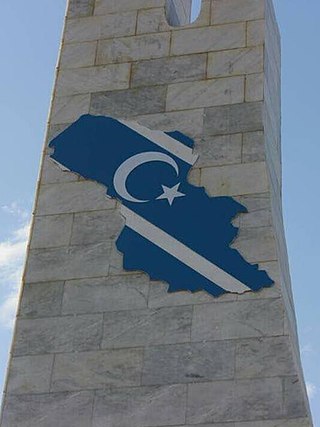Altun Kupri
Town in Kirkuk Governorate, Iraq From Wikipedia, the free encyclopedia
Town in Kirkuk Governorate, Iraq From Wikipedia, the free encyclopedia
Altun Kupri (Arabic: التون كوبري,[3] Turkish: Altınköprü, lit. 'Golden Bridge',[4] Kurdish: پردێ, romanized: Pirdê[5][6]) is a town in Kirkuk Governorate, Iraq. Its inhabitants are predominantly Turkmen, with a minority of Arabs and Kurds.[7][8][9] It is located on the shores of the Little Zab and on the Erbil–Kirkuk road.[10][11] The town is described as having an 'intrinsic strategic significance' and is disputed.[12][13]


Altun Kupri | |
|---|---|
Town | |
 | |
| Coordinates: 35°45′12″N 44°08′37″E | |
| Country | |
| Governorate | Kirkuk Governorate |
| District | Dibis |
| Elevation | 284 m (935 ft) |
| Population (2013)[2] | |
| • Total | 9,275 |
Altun Kupri is the Anglicized version of the Iraqi Turkmen word for "altın köprü" in standard Turkish language, which is literally 'Golden Bridge' in English.[4]
There are different theories for the town's name. Some believe that 'Golden Bridge' refers to a Turkish or Kurdish woman of that name, while others believe it refers to the colorful caravans that passed the town and its bridge on their way between Mosul and Baghdad.[14]
Ottoman Sultan Murad IV built two bridges in the town which made it gain importance. It was visited by many European travellers and known for its scenery.[14]
Altun Kupri had approximately 400 to 500 households by the end of the 18th century. Mirza Abu Taleb Khan visited the town in 1799, describing it as a big village with a mixed Kurdish and Turkmen population busy with farming. Moreover, it was a trading center between Kurdistan and Baghdad for figs, grapes and other agricultural products. Under the reign of Muhammad Pasha of Soran (1813-1836) he was able to extend his influence to this town and force the Ottoman governor of Baghdad to recognize his control.[15] In 1906, the town had 4,000 inhabitants.[16] The Ottomans destroyed the town's famous stone-built bridges in 1918 and replaced it with modern steel constructions.[14]
In 1925, the town's population was predominantly Turkmen.[17]
The town experienced Arabization during the Saddam era and an increased militarization to counter uprisings in the north from spreading towards Kirkuk.[18]
More than a hundred Turkmen civilians were killed in the 1991 Altun Köpru massacre during the Gulf War by the Iraqi Army.[19]
In the 1947 census Kurds constituted 70% of the population but decreased to 50% in 1957. In the census of 1965, the percentage of Kurds fell further to 25.7% but increased again to 75.6% in 1977.[20] In the 2005 elections, the DPAK received 80% of the vote in the sub-district of Altun Kupri.[21]
Seamless Wikipedia browsing. On steroids.
Every time you click a link to Wikipedia, Wiktionary or Wikiquote in your browser's search results, it will show the modern Wikiwand interface.
Wikiwand extension is a five stars, simple, with minimum permission required to keep your browsing private, safe and transparent.